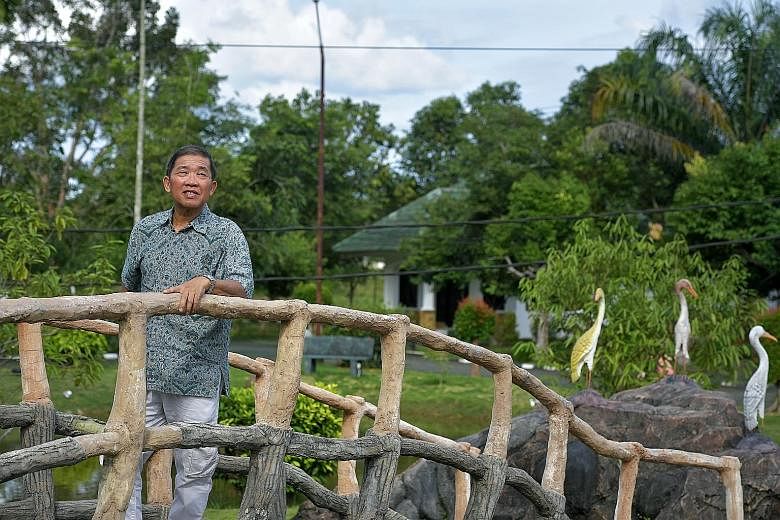On popular hotel booking website Agoda, a listing advertises a "wellness" village on Bintan island that targets elderly Singaporean travellers seeking a rustic getaway.
Typical of resorts on the island, the Lohas Wellness Village located some 23km away from Tanjung Pinang ferry terminal offers a mix of two- and three-bedroom villas, meal plans, and activities such as morning yoga sessions.
But the team behind the 20ha facility has far more ambitious designs for it - it hopes to set up a university modelled after the old Nanyang University, or Nantah, on its premises.
Singaporean Ling Weng Kee, 65, chief executive of Indonesian- incorporated Bintan Nanyang Resources, which manages the village, said the initial plan was to develop a retirement village targeted at elderly travellers, and a traditional Chinese medicine (TCM) college to supply trained professionals to work in the villas.
The company had chosen Bintan instead of Singapore to start the village due to cheaper operating costs and the abundance of land.
The village obtained its licence to operate as an accommodation business in February, and was soft-launched in March. Its official opening is slated for next year.
But Mr Ling and his partners started dreaming bigger after Indonesian Bambang Suryono,chief editor of Chinese-language Indonesian newspaper Inhua Daily, approached them with a plan to set up the Asean Nanyang University, styled after Nantah.
Mr Suryono, 79, chairs the Asean Nanyang Education Foundation, which provides scholarships for students to study in China. He views Nantah's closure "as a sad period for the Chinese community".
Nantah was set up in 1956 with support from Chinese communities in Singapore and the region. It closed in 1980 due to falling enrolment - a painful chapter for some in the Chinese community here.
Saying that Chinese people in Indonesia have also suffered - Chinese characters and festivals were banned and ethnic Chinese had to adopt Indonesian names during then President Suharto's regime - Mr Suryono explained that he wanted to contribute to furthering Chinese education.
The retirement village, which has about 6ha of unoccupied land, is a suitable location for the new university, he said.
While he acknowledged that its content and infrastructure has to keep up with the times, he stated: "It can embody Nantah's spirit and promote Chinese culture."
Cognisant of the challenges facing the ambitious project, Mr Suryono said: "It will take a long time, maybe 20 or 30 years. But I think if we don't give up, we will eventually get there. Hopefully, in the next 10 years, we will have more colleges, and be one step closer to calling it a university."
A group of Nantah alumni went to the village last December after hearing about the plan.
One of them was Dr Chew Moh Yuen, a freelance researcher who graduated from Nantah in 1979. She said: "As a former Nantah student, I'm excited and very supportive of this endeavour. I hope they can realise this dream."
But fellow Nantah graduate Lee Bon Kwe, 64, reckoned it might be a stretch to link the planned university to Nantah.
"Education is a good thing and I do wish them all the best. But the new university can never be like the old Nantah," said Mr Lee, a member of the Association of Nanyang University Graduates in Singapore's executive committee.
The TCM college, now in the planning stage, will be the first step towards realising the university dream.
Mr Ling said they are now waiting for the Indonesian authorities to issue a licence to the TCM college, which he estimated will take another three months.
The halls in the retirement village provide an interim venue for classes to be run, while the villas can also double up as hostels for students.
"We will work on a physical building for the college once student numbers are steady," he added.
Also on the cards are a language college, a maritime college, and a tourism management college.
Mr Ling, a Nantah alumnus who graduated from its accountancy faculty in 1976, said there is a lingering regret in some quarters of the Chinese community that Nantah's closure has led to the Chinese language and culture losing significance nationally.
"This is probably our last hope to revive the spirit of the old Nantah," he said, referring to how some alumni had previously come up with similar ideas that did not materialise.
Asked about what would happen should the university dream fail, Mr Ling said he would focus on the original resort and TCM college.
"We will go back to our initial plan. That will still continue."


